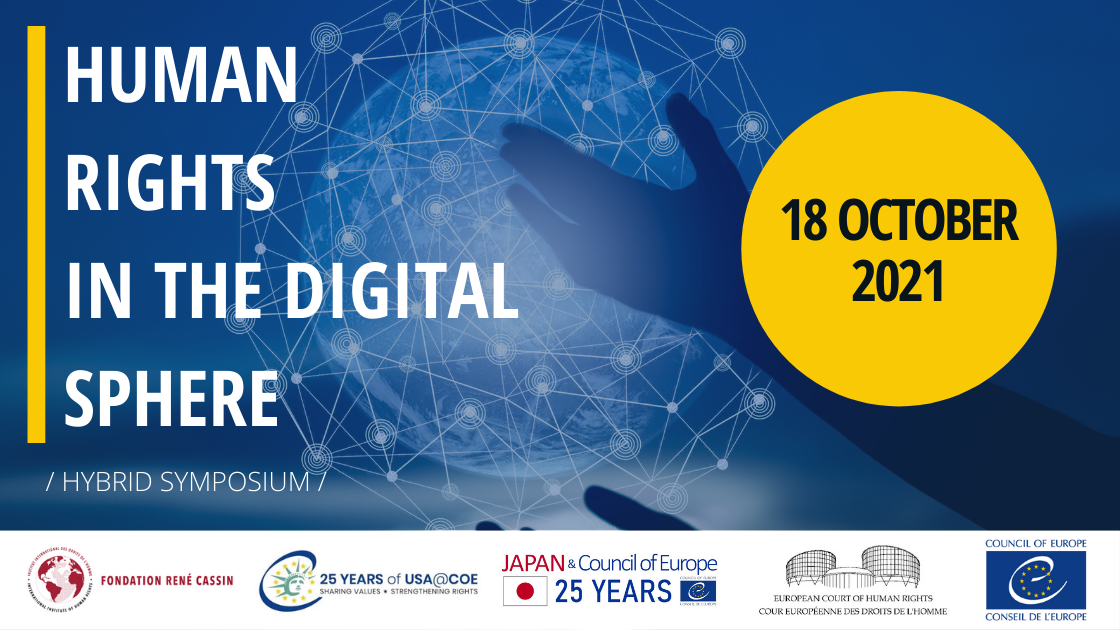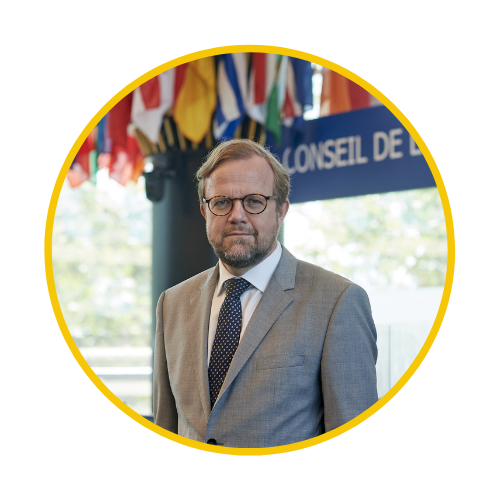Symposium: Human Rights in the Digital Sphere

Co-organised by:
Consulate General of Japan,
Consulate General of the United States of America,
Directorate General of Human Rights and Rule of Law of the Council of Europe,
European Court of Human Rights,
René Cassin Foundation
 WATCH RECORDINGS
WATCH RECORDINGS 
The digital transformation of our society is certainly one of the fastest and most profound transitions of civilization we have ever experienced. This digital age is leading us to interact more and more online, for information, entertainment, consumption or work. The Covid-19 pandemic revealed the potential of digital services which have enabled people to continue to interact and engage and have made us more resilient. But many questions remain about the consequences of this transformation and its impact on human rights.
The issue of privacy has long been very topical in our daily lives, but the increased use of the virtual space and the development of technology such as AI, brings these debates even more into the limelight. Rather than reducing discrimination or inequality, some algorithmic decision-making systems can exacerbate it, particularly in the public sphere. With the use of predictive features in the justice system, even a new source of law seems to be emerging. Facial recognition tools are bringing back concepts such as physiognomy and the belief that behavioral traits can be inferred from physical characteristics.
Other paramount issues which cannot be separated from internet are freedom of expression and access to correct and trustworthy information. Whereas the internet greatly facilitates ways to express ourselves and the diversity of information available, it is also true that some stakeholders have the power to ban, remove or distort online content according to their interest. How should we draw the line between information worth sharing and that to be banned? And who are those entitled to do so?
Full enjoyment of our rights in cyberspace comes with an adequate protection against the risks in an online environment. Right to private life, human dignity, safety, integrity of the person, non-discrimination are at stake under threat from cybercrime. How can the governments fulfill their positive obligations to protect individuals against crime and safeguard the fundamental rights of cybercrime victims? This challenge requires careful balancing to provide efficient criminal justice response with appropriate rule of law safeguards.
Speakers from different legal systems and jurisdictions, experts and governmental representatives will exchange views, while tackling the complexity of protecting human rights in the digital sphere in our daily lives activities in a one day seminar.
The outcomes of the discussions build further on the current debate on a global scale, about the actions necessary to include in a comprehensive approach in order to address the radical changes digitalization is brining to the online and offline environments.

Digital technology is evolving at an amazing speed. Ensuring that it respects human rights is no easy matter. But for the Council of Europe, this is the very purpose of our work.
The European Convention on Human Rights applies to all aspects of life on our continent – online and offline.
So, as technology advances, so must our efforts to keep pace with it, and to ensure that it harnesses our common standards, rather than undermining them
Bjørn Berge
Deputy Secretary General, Council of Europe

While the digital sphere is an undeniable source of hope and progress, it may also pose a number of risks for human rights, such as hateful online content, mass surveillance programmes resulting in intrusions on privacy, and artificial intelligence programmes which are unintentionally discriminatory.
It becomes self-evident that the digital sphere must be better regulated by democratically promulgated norms that guarantee fundamental rights.
Robert Spano
President, European Court of Human Rights

The rise in ransomware that can target critical infrastructure is of particular concern to the U.S. government as well as our EU and global partners. Cybercrime doesn't recognize countries' borders--it is truly an international problem. Similarly, with the increased use of the internet, international tools are necessary to fight even so-called ordinary crime. A murder may have been committed in one country, but there may be crucial evidence in emails held by a service provider in another country. The Budapest Convention, along with its new Second Additional Protocol, is an essential tool for law enforcement to work together across borders to fight crime
Darragh Paradiso
Consul General of the United States of America in Strasbourg

Since Japan obtained the Observer status to the Council of Europe 25 years ago, the landscape surrounding the digital world changed drastically. However, one fact remains the same. The issues of the digital world must be addressed within the scope of the three fundamental values, namely human rights, democracy, and rule of law.
We therefore are very happy to host this symposium with our partners who share these values. I believe this symposium will be a wonderful kick off for further cooperation in the coming 25 years and more.
Takeshi Akamatsu
Ambassador, Permanent Observer of Japan to the Council of Europe

C’est l’honneur du Conseil de l’Europe, à travers la Cour européenne des droits de l’homme, mais plus largement dans tous ses champs d’activité, de la bioéthique à la cyber-criminalité, de la protection des données à la lutte contre la traite des êtres humains, de rester cette vigie des droits de l’homme, aujourd’hui comme hier et encore plus pour l’avenir, sur le continent européen et bien au-delà comme l’atteste la contribution de nos amis Américains et Japonais
Emmanuel Decaux
President, René Cassin Foundation


